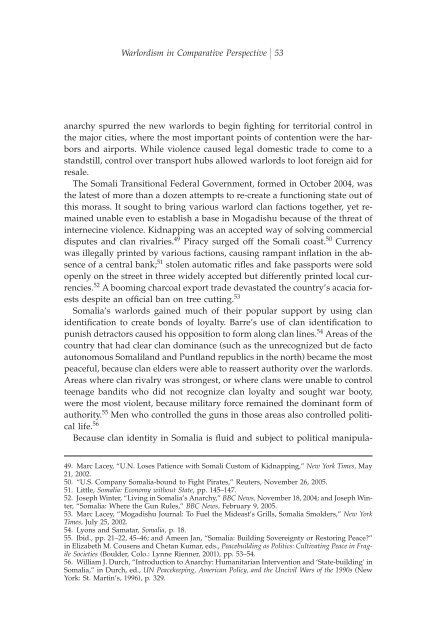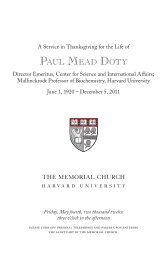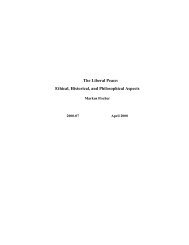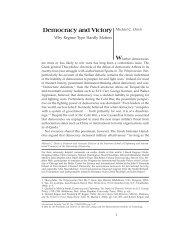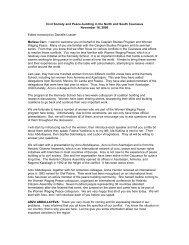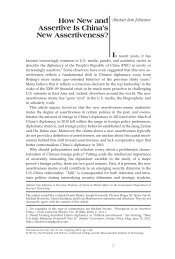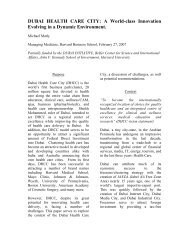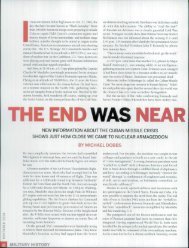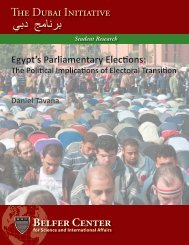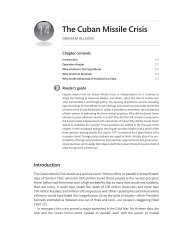Warlordism in Comparative Perspective - MIT Press Journals
Warlordism in Comparative Perspective - MIT Press Journals
Warlordism in Comparative Perspective - MIT Press Journals
You also want an ePaper? Increase the reach of your titles
YUMPU automatically turns print PDFs into web optimized ePapers that Google loves.
<strong>Warlordism</strong> <strong>in</strong> <strong>Comparative</strong> <strong>Perspective</strong> 53<br />
anarchy spurred the new warlords to beg<strong>in</strong> ªght<strong>in</strong>g for territorial control <strong>in</strong><br />
the major cities, where the most important po<strong>in</strong>ts of contention were the harbors<br />
and airports. While violence caused legal domestic trade to come to a<br />
standstill, control over transport hubs allowed warlords to loot foreign aid for<br />
resale.<br />
The Somali Transitional Federal Government, formed <strong>in</strong> October 2004, was<br />
the latest of more than a dozen attempts to re-create a function<strong>in</strong>g state out of<br />
this morass. It sought to br<strong>in</strong>g various warlord clan factions together, yet rema<strong>in</strong>ed<br />
unable even to establish a base <strong>in</strong> Mogadishu because of the threat of<br />
<strong>in</strong>ternec<strong>in</strong>e violence. Kidnapp<strong>in</strong>g was an accepted way of solv<strong>in</strong>g commercial<br />
disputes and clan rivalries. 49 Piracy surged off the Somali coast. 50 Currency<br />
was illegally pr<strong>in</strong>ted by various factions, caus<strong>in</strong>g rampant <strong>in</strong>ºation <strong>in</strong> the absence<br />
of a central bank; 51 stolen automatic riºes and fake passports were sold<br />
openly on the street <strong>in</strong> three widely accepted but differently pr<strong>in</strong>ted local currencies.<br />
52 A boom<strong>in</strong>g charcoal export trade devastated the country’s acacia forests<br />
despite an ofªcial ban on tree cutt<strong>in</strong>g. 53<br />
Somalia’s warlords ga<strong>in</strong>ed much of their popular support by us<strong>in</strong>g clan<br />
identiªcation to create bonds of loyalty. Barre’s use of clan identiªcation to<br />
punish detractors caused his opposition to form along clan l<strong>in</strong>es. 54 Areas of the<br />
country that had clear clan dom<strong>in</strong>ance (such as the unrecognized but de facto<br />
autonomous Somaliland and Puntland republics <strong>in</strong> the north) became the most<br />
peaceful, because clan elders were able to reassert authority over the warlords.<br />
Areas where clan rivalry was strongest, or where clans were unable to control<br />
teenage bandits who did not recognize clan loyalty and sought war booty,<br />
were the most violent, because military force rema<strong>in</strong>ed the dom<strong>in</strong>ant form of<br />
authority. 55 Men who controlled the guns <strong>in</strong> those areas also controlled political<br />
life. 56<br />
Because clan identity <strong>in</strong> Somalia is ºuid and subject to political manipula-<br />
49. Marc Lacey, “U.N. Loses Patience with Somali Custom of Kidnapp<strong>in</strong>g,” New York Times, May<br />
21, 2002.<br />
50. “U.S. Company Somalia-bound to Fight Pirates,” Reuters, November 26, 2005.<br />
51. Little, Somalia: Economy without State, pp. 145–147.<br />
52. Joseph W<strong>in</strong>ter, “Liv<strong>in</strong>g <strong>in</strong> Somalia’s Anarchy,” BBC News, November 18, 2004; and Joseph W<strong>in</strong>ter,<br />
“Somalia: Where the Gun Rules,” BBC News, February 9, 2005.<br />
53. Marc Lacey, “Mogadishu Journal: To Fuel the Mideast’s Grills, Somalia Smolders,” New York<br />
Times, July 25, 2002.<br />
54. Lyons and Samatar, Somalia, p. 18.<br />
55. Ibid., pp. 21–22, 45–46; and Ameen Jan, “Somalia: Build<strong>in</strong>g Sovereignty or Restor<strong>in</strong>g Peace?”<br />
<strong>in</strong> Elizabeth M. Cousens and Chetan Kumar, eds., Peacebuild<strong>in</strong>g as Politics: Cultivat<strong>in</strong>g Peace <strong>in</strong> Fragile<br />
Societies (Boulder, Colo.: Lynne Rienner, 2001), pp. 53–54.<br />
56. William J. Durch, “Introduction to Anarchy: Humanitarian Intervention and ‘State-build<strong>in</strong>g’ <strong>in</strong><br />
Somalia,” <strong>in</strong> Durch, ed., UN Peacekeep<strong>in</strong>g, American Policy, and the Uncivil Wars of the 1990s (New<br />
York: St. Mart<strong>in</strong>’s, 1996), p. 329.


